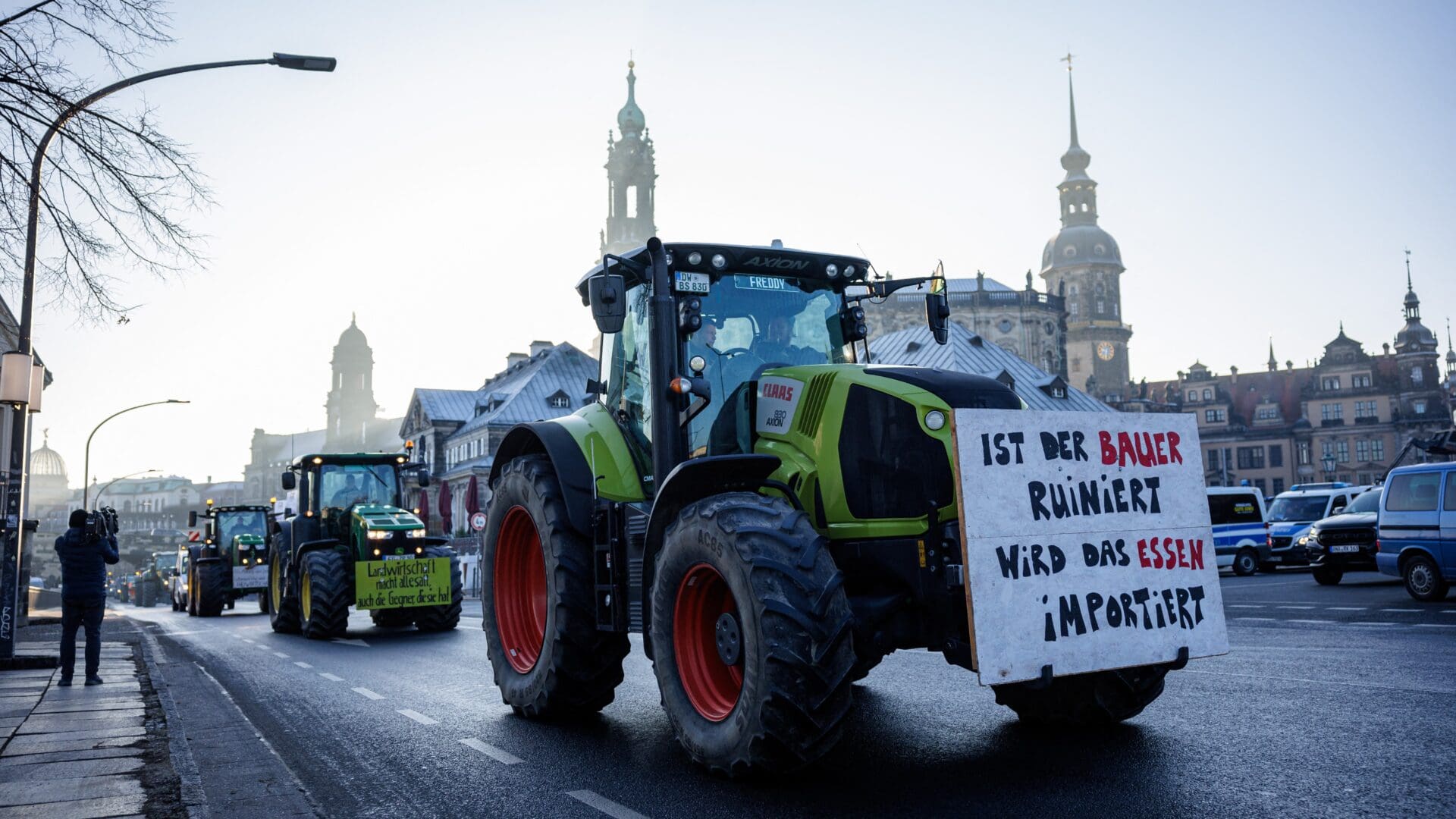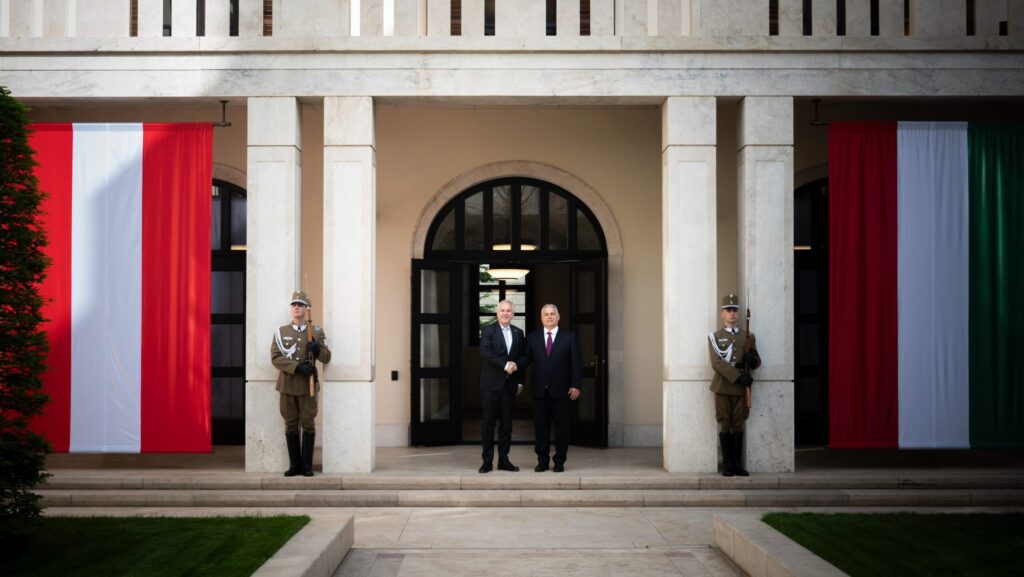Motorways blocked by tractors, office buildings adorned with splatters of fertilizer, opposition politicians imprisoned for political reasons, public media pushed to the margins, and the deliberate dismantling of the rule of law and constitutionalism—these are just a few of the unsettling events unfolding in the left-wing-led countries of Europe in recent months. The prolonged crises have starkly revealed the left’s inability to effectively represent and safeguard the interests of the electorate, plunging once robust and stable European states into chaos.
Germany
Germany is frequently hailed as the powerhouse of the European economy. Yet, in recent years, the governments of the European Union’s leading state have been grappling with challenges brought on by a series of misguided decisions. From the permissive immigration policy, to the response to the war in Ukraine, the unwavering support for Ukraine, at the expense of German citizens, appears to have set in motion irreversible processes in Germany.
After the federal government, led by Chancellor Olaf Scholz, announced last December its decision to withdraw several subsidies for farmers in an effort to address the budget deficit, discontented farmers, already perturbed by the country’s notably poor economic performance, swiftly took to the streets.
They blocked major roads, compelling the government to backtrack. Although the Scholz cabinet had initially announced on 4 January that it would withdraw a portion of its subsidy-cutting plans, this move failed to appease the farmers. The protests, spearheaded by the German Farmers’ Association (DBV), are calling for a complete abandonment of the proposed savings plans.
Meanwhile, the traffic-light coalition comprising liberals, greens, and socialists remains deeply engrossed in matters concerning Ukraine, steadfastly supporting the war-torn country. This is not surprising at all, especially when we remember the words of Foreign Minister Annalena Baerbock in August 2022:
‘I don’t care what our voters think; I want to deliver on my promise to the Ukrainian people,’ she declared then.
German FM: I will put Ukraine first “no matter what my German voters think” or how hard their life gets. pic.twitter.com/GwAqIZ2jL7
— Ignorance, the root and stem of all evil (@ivan_8848) August 31, 2022
As a government crisis unfolds alongside a €17 billion budget deficit, Olaf Scholz has called on Western allies to intensify their support for Ukraine. In this context, it’s not surprising that the Alternative for Germany (AfD), a right-wing party prioritizing the genuine interests of the German people, has experienced a surge in popularity, now holding the position of the second-largest political party in the country. In contrast, the Chancellor’s party has witnessed a decline of around 10 percentage points in popularity since the last federal elections in 2021.
Poland
As the largest country in Central and Eastern Europe, Poland has seen the importance of maintaining a stable government in recent years. The Polish economy has exhibited consistent growth, experiencing only minor fluctuations. Furthermore, the Polish army has undergone successful modernization, and the country’s borders have been resolutely defended against illegal immigration.
Following the elections in October last year, the Law and Justice (PiS) party, which had been in power for two terms, faced a setback as they failed to form a government despite securing the plurality of votes. Opposition forces led by Donald Tusk, former President of the European Council, took charge.
It didn’t take long for the frustration and grievances accumulated during the lengthy years in opposition to be avenged.
In December, the newly elected Polish government announced its intention to shut down public television, radio, and the Polish state news agency PAP, perceiving them as mouthpieces for PiS. These decisions, undermining the rule of law and the constitution, surprisingly, have not elicited any response or rebuke from Brussels.
The European Parliament, known for its sensitivity to ‘rule of law’ matters, has not uttered a single word of criticism regarding Donald Tusk’s authoritarian methods.
The media conflict in Poland has reached a critical juncture, with the authorities arresting two PiS politicians, former Interior Minister Mariusz Kamiński and former Deputy Interior Minister Maciej Wąsik, this week. The arrests, appearing to be clearly politically motivated, evoke memories of the darkest years in Poland’s history. The authoritarian nature of this decision is underscored by the fact that even civil society organizations, typically supportive of the Tusk government, express disagreement.
The new cabinet’s actions led to hundreds of thousands of people flooding the streets of Warsaw on Thursday, calling for the release of the jailed politicians.
Former Prime Minister Mateusz Morawiecki addressed the demonstration, asserting, ‘We will not let go of what this government has done. We will hold them accountable for everything, don’t forget that.’ The repercussions of the Tusk government’s actions are evident in a reported sharp decline in foreign investors’ confidence in Poland, according to Bloomberg.
Polish citizens came to Warsaw in aim to express his protest against left power regime who won election in Poland. Communists called left parties undermined also referendum where Polish citizens indicated that don’t want to be flooding by blacks Muslims. pic.twitter.com/aoEpX10NJd
— Tommie (@Tommie_Warsaw) January 11, 2024
Taking inspiration from the Polish example, Márton Tompos, a left-wing Momentum MP, shared a Facebook post expressing the possibility of similar measures being implemented in Hungary if there were a change of government.
France
In France, public discontent and protests are not uncommon; they are inherent to the French political system. In the spring of 2023, millions of people flooded the streets in major French cities to oppose President Emmanuel Macron's pension reform, which sought to raise the retirement age from 62 to 64. These protests frequently resulted in clashes between demonstrators and police. Despite widespread discontent, Macron and his government remained resolute in implementing the unpopular measure.
Decades of permissive immigration policies by French governments and the increasing proportion of the Muslim population in French society manifest in the dynamics of French protests.
Violent demonstrations erupted in the summer of 2023 following the death of a 17-year-old youth from an immigrant background during a police stop. The riots were marked by immediate violence, with enraged crowds setting the streets of Paris ablaze. The French government had to mobilize approximately 45,000 police officers to restore and maintain order.
Following the bloody terrorist attack on Israel by the Palestinian terrorist organization Hamas, pro-Palestinian demonstrations were also organized in France, which has a Muslim population of nearly 4 million. The government has banned them, but there have still been a number of such demonstrations, many of which have ended in clashes between protesters and police.
With the outbreak of the Israel-Hamas conflict, France, along with other Western European countries, has witnessed a significant rise in anti-Semitic incidents, instilling fear in its Jewish community of nearly half a million.
As a consequence, Emmanuel Macron's popularity has plummeted, with 68 per cent of the French populace holding a negative opinion of the president. Furthermore, his party has dwindled, now ranking as the third-largest political force in the country. A series of crises has bolstered the right wing, with the National Rally (NR), previously led by Marine Le Pen, reaching 28 per cent in Politico's polls—which constitutes an increase of nearly 10 percentage points in the last two years.
Spain
Spain has been in political turmoil since the special elections last July. Despite winning the plurality of votes, the People's Party (PP), led by Alberto Feijoó, has been unsuccessful in forming a government.
Socialist Prime Minister Pedro Sánchez, in apparent disregard for the constitution, has pledged amnesty to Catalan pro-independence leaders—who are widely perceived as criminals by the majority of Spaniards—in exchange for maintaining his power. Additionally, he has entered into agreements that significantly diminish the central government's authority over autonomous regions such as Catalonia and the Basque Country.
Last autumn, hundreds of thousands of people took to the streets in major Spanish cities to demand Pedro Sánchez's resignation over decisions that amounted to quasi-treason.
The discontent has not abated since then, with an anti-government demonstration on New Year's Eve in front of the Spanish Socialist Workers' Party (PSOE) headquarters, where a puppet of the head of government was smashed.
Sánchez's agreement with the Catalans has faced significant criticism from various independent judiciary organizations, deeming it unconstitutional. Furthermore, Justice Commissioner Didier Reynders has written to the Spanish government, expressing the European Commission's 'serious concern' about these developments.
The events described above would be unthinkable in Hungary. This is not due to what the European left often labels as the 'authoritarian establishment.' Instead, it is a result of the Hungarian government's unwavering commitment to prioritizing the interests of its people. This dedication has enabled Fidesz-KDNP to govern with remarkable stability since 2010, representing the country's interests with resolute approval from the Hungarian electorate.








